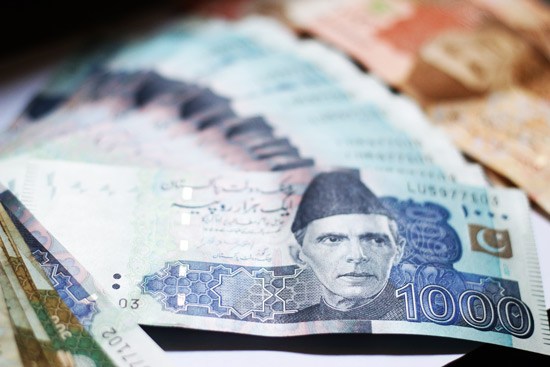Learning Center
Revamping Tax Enforcement: Pakistan's Bold Move

In recent weeks, television screens across Pakistan have begun issuing a stark warning: pay your taxes, or risk losing vital services like your cell phone, gas, or electricity connections. These advertisements, sponsored by Pakistan's tax authority, are a reminder of the nation's ongoing struggle with tax collection, a challenge that could have far-reaching consequences for its economy.
Tax evasion is a chronic problem in Pakistan — a 2012 NPR article notes that only about 2 percent of the population is registered in the tax system, and the government collects just 9 percent of the country's wealth in taxes, one of the lowest rates in the world. The problem has not improved.
A new investigative report is now making headlines, with the Financial Times revealing that just a third of the country's 446 federal lawmakers bothered to file income tax returns last year in 2022.
The country's inability to boost its tax revenue poses a threat to a $3 billion IMF bailout package, designed to prevent an economic crisis. Failure to meet tax collection targets risks destabilizing the country, especially with elections looming on the horizon.

The IMF bailout, while providing temporary fiscal relief, demands that Pakistan broaden its tax base and increase certain levies. However, implementing such measures has been met with resistance from politicians. Kristalina Georgieva, the IMF's managing director, has emphasized the importance of fiscal responsibility, urging officials in Islamabad to take necessary steps to avoid a debt crisis.
Despite these warnings, Pakistan's tax-to-GDP ratio remains alarmingly low, standing at just over 10 percent in 2021. The Federal Board of Revenue has set ambitious tax revenue targets for the current financial year, but achieving them requires cracking down on tax evasion and closing existing loopholes.
One notable loophole involves agricultural landowners, who enjoy significant exemptions despite their substantial contribution to the economy. This disparity in tax treatment sends a clear message to others: the system is lenient towards certain groups, undermining overall compliance efforts.
"Tax evasion is a social norm in Pakistan," Umar Cheema told NPR a decade ago – and it is clear nothing has changed in recent years.

A reporter for the Pakistani English-language newspaper The News and a founder of the Center for Investigative Reporting in Pakistan, Cheema continued, “They are tax evaders. They are tax dodgers. And those who are paying some amount, it doesn't match with their living style. They live like [a] prince, and they pay like a poor man."
Various reports’ findings have sparked outrage among citizens. Naseer Rajput, a resident of Islamabad, expressed his frustration to NPR reporters, saying, "A poor man pays all his taxes, and those who get elected to become our rulers evade taxes. But they expect their people to pay?"
Mohammed Farooq echoed Rajput's sentiments, emphasizing the importance of leaders paying taxes. "I have been a taxpayer since 1992 and submit my returns regularly, and pay taxes regularly," he said.
Pakistan's latest efforts to combat tax evasion by halting essential services come at a critical time. The country's tax-to-GDP ratio remains low, just over 10 percent in 2021. As previously noted, this underperformance not only jeopardizes Pakistan's financial stability as a nation but also impacts its ability to meet international obligations, such as the terms of the IMF bailout program.
While Pakistan's bold move to crack down on tax evasion is commendable, it also highlights the need for comprehensive reforms and stricter enforcement mechanisms. Similar issues with tax compliance plague many countries worldwide. For instance, CNBC reports that in India, only about 1% of the population pays income tax, contributing to significant revenue losses for the government.

If Pakistan proves that taking away cell phones, electricity, and other services is a successful way to bring tax evaders to justice, other nations may pass similar laws in the future. But, the effectiveness of Pakistan’s novel method remains to be seen.
NEVER MISS A STORY.
Sign up for our newsletters and get our articles delivered right to your inbox.
Rose Tax & Financial
Cedar Crest, New Mexico 87008
Sat: 10:00am to 2:00pm
Check the background of your financial professional on FINRA's BrokerCheck
Avantax affiliated Financial Professionals may only conduct business with residents of the states for which they are properly registered. Please note that not all of the investments and services mentioned are available in every state. Securities offered through Avantax Investment Services℠, Member FINRA, SIPC, Investment Advisory services offered through Avantax Advisory ServicesSM, Insurance services offered through an Avantax affiliated insurance agency. 3200 Olympus Blvd., Suite 100, Dallas, TX 75019. 972-870-6000.
The Avantax family of companies exclusively provide financial products and services through its financial representatives. Although Avantax Wealth Management® does not provide or supervise tax or accounting services, Avantax representatives may offer these services through their independent outside business. Content, links, and some material within this website may have been created by a third party for use by an Avantax affiliated representative. This content is for educational and informational purposes only and does not represent the views and opinions of Avantax Wealth Management® or its subsidiaries. Avantax Wealth Management® is not responsible for and does not control, adopt, or endorse any content contained on any third party website.
This information is not intended as tax or legal advice. Please consult legal or tax professionals for specific information regarding your individual situation.
The information being provided is strictly as a courtesy. When you link to any of the web sites provided here, you are leaving this web site. We make no representation as to the completeness or accuracy of information provided at these web sites. Nor is the company liable for any direct or indirect technical or system issues or any consequences.
For Important Information and Form CRS please visit https://www.avantax.com/disclosures.